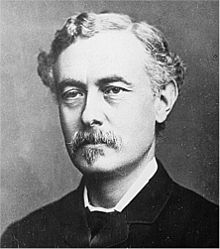William A. Tilden
Sir William Augustus Tilden FRS (born August 15, 1842 in London , † December 11, 1926 ) was a British chemist in the field of organic chemistry .
Life
After attending school, he made vocational training for pharmacists and then studied for a year at the Royal College of Chemistry , as a projectionist at the before 1863-1872 Pharmaceutical Society worked. In 1872 he became a lecturer in chemistry at Clifton College , Bristol, and then in 1880 accepted a position as holder of the chair of chemistry at Mason College . Also in 1880 he became a Fellow of the Royal Society .
In 1894 he succeeded Thomas Edward Thorpe as Professor of Chemistry at the Royal College of Science in South Kensington .
During his work there he proved that with nitrosyl chloride there is only one compound of nitrogen monoxide and chlorine and that this is a valuable reagent for the investigation of terpenes . He also discovered that isoprene , which has been known as a component of natural rubber since Charles Hanson Greville Williams (1860) , can be obtained from turpentine oil (but found no way to use it commercially). He also proposed the correct structural formula for isoprene in 1882.
He also discovered that specific heat changes with temperature. The specific heat capacity decreases with falling temperature and increases when the temperature rises, the extent of the shift being inversely proportional to the atomic weight of the element . This discovery was of great importance to numerous industries.
In addition, he was not only President of the Chemical Society from 1903 to 1905 , but also Vice-President of the Royal Society from 1904 to 1906.
In 1908, Tilden was awarded the Royal Society's Davy Medal, the highest British honor for scientists in the field of chemistry, for his chemical discoveries, particularly in heat capacity and terpenes .
In 1909 he was beaten to the Knight Bachelor and from then on carried the title of nobility "Sir". His son Philip Armstrong Tilden (1887–1956) was a well-known architect.
The Royal Society of Chemistry awards the Tilden Prize annually in his memory .
Fonts
- Famous Chemists: the men and their work, Routledge 1921
Publications
- Famous Chemists: the men and their work , New York, 1921 (Reprinted 2007, ISBN 978-1406704839 )
source
- Chambers Biographical Dictionary , p. 1500, Edinburgh 2002, ISBN 0-550-10051-2
Individual evidence
| personal data | |
|---|---|
| SURNAME | Tilden, William A. |
| ALTERNATIVE NAMES | Tilden, Sir William Augustus |
| BRIEF DESCRIPTION | English chemist |
| DATE OF BIRTH | August 15, 1842 |
| PLACE OF BIRTH | London |
| DATE OF DEATH | December 11, 1926 |

